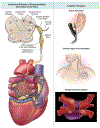The vagus nerve in cardiovascular physiology and pathophysiology: From evolutionary insights to clinical medicine
- PMID: 36641366
- PMCID: PMC10336178
- DOI: 10.1016/j.semcdb.2023.01.001
The vagus nerve in cardiovascular physiology and pathophysiology: From evolutionary insights to clinical medicine
Abstract
The parasympathetic nervous system via the vagus nerve exerts profound influence over the heart. Together with the sympathetic nervous system, the parasympathetic nervous system is responsible for fine-tuned regulation of all aspects of cardiovascular function, including heart rate, rhythm, contractility, and blood pressure. In this review, we highlight vagal efferent and afferent innervation of the heart, with a focus on insights from comparative biology and advances in understanding the molecular and genetic diversity of vagal neurons, as well as interoception, parasympathetic dysfunction in heart disease, and the therapeutic potential of targeting the parasympathetic nervous system in cardiovascular disease.
Keywords: Cardiovascular disease; Cardiovascular physiology; Interoception; Neuromodulation; Vagus nerve.
Copyright © 2023 Elsevier Ltd. All rights reserved.
Conflict of interest statement
Conflict of Interest
Pradeep Rajendran and Kalyanam Shivkumar are co-founders of NeuCures, Inc. University of California, Los Angeles has patents developed by Kalyanam Shivkumar relating to cardiac neural diagnostics and therapeutics
Figures

References
-
- Weber E, Muskelbewegung, in: Wagner R (Ed.), Handworterbuch der Physiologie, Friedrich Vieweg, Braunschweig, 1846, pp. 1–122.
-
- Standish A, Enquist LW, Schwaber JS, Innervation of the heart and its central medullary origin defined by viral tracing, Science 263(5144) (1994) 232–4. - PubMed
-
- Geis GS, Wurster RD, Cardiac responses during stimulation of the dorsal motor nucleus and nucleus ambiguus in the cat, Circ Res 46(5) (1980) 606–11. - PubMed

